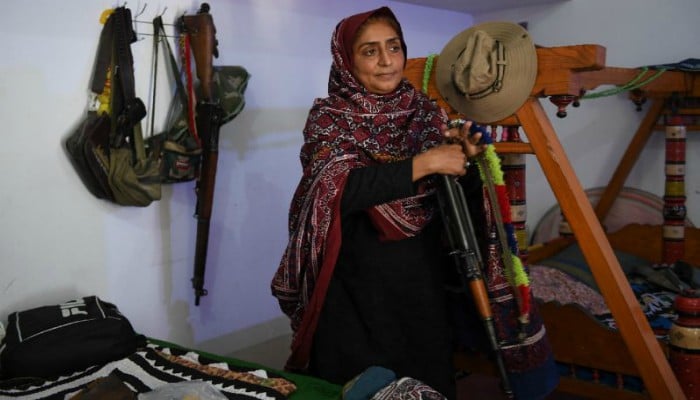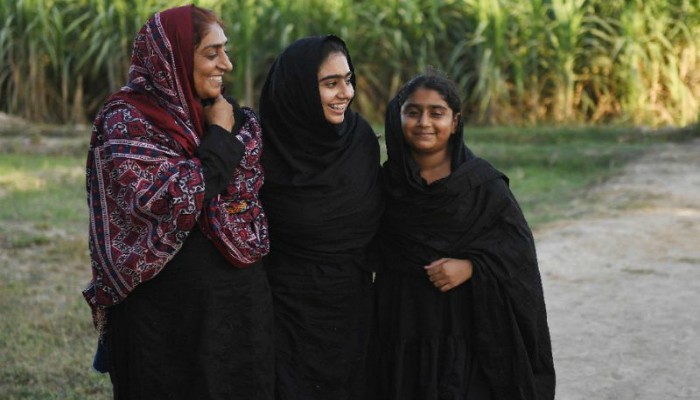Oscars bid for story of 'Pakistan's toughest woman'

QAZI AHMED, NAWABSHAH: : As 200 furnished men encompassed their home on a hot August night in 2005, Nazo Dharejo and her sisters snatched their Kalashnikov and weak supply of ammo and moved to the rooftop.
The gunfight which took after earned her the moniker "Pakistan's hardest lady", and turned into the subject of a film which has been entered in one year from now's Academy Awards, competing for grandness close by substantial hitters, for example, Angelina Jolie's "First They Killed My Father" and Joachim Trier's "Thelma".
A world far from Hollywood's celebrity main street, at the hereditary home Dharejo battled for in Pakistan's rustic Sindh area, she depicted the night which could prompt Oscar radiance.
"I will murder them or kick the bucket here however never withdraw," Dharejo, now in her late 40s, said as aggressors assaulted her home.

Her significant other beseeched her to remain down yet she can't, looking down her own relatives - who were outfitted and had long tried to take her family's property after her dad passed on leaving no male beneficiary, she said.
Her granddad had a few spouses, and the male beneficiaries in different branches of his family were making a case for her legacy.
Be that as it may, her family had resisted provincial Pakistani social standards of an opportunity to instruct their little girls and show them they were in the same class as young men, and the sisters were eager to give their lives to demonstrate it.
From their position on the rooftop their modest armed force - the three sisters, Dharejo's significant other, and some dependable companions and neighbors - held off the attack, with family unit staff making brave keeps running for more ammo until the point that sunshine broke.
A five-year fight in court over the land in the long run observed her adversaries pay a large portion of a million rupees ($4,800) in remuneration and offer an open statement of regret - a demonstration of most extreme disrespect in provincial Pakistan.
The Waderi
Conceived in a moderate medieval family, Dharejo was qualified for take in the Koran at home - and that was all.
She convinced her dad to enable her and her sisters to think about English, which prepared for her to pick up her Bachelor of Arts in financial matters at Sindh University, where she could learn at home and show up out in the open just for the exams.
Be that as it may, the advanced equity framework has made couple of advances into country Sindh, where little has changed for a considerable length of time in a general public overwhelmed by feudalism, and the grisly years-long battle about her family's property undermined commonly to crash her advance.
"It continued strengthening. Five, six killings occurred and in 1992 my sibling was likewise killed," she clarified.
At the point when her dad kicked the bucket that same year, the ladies who went to pay sympathies provoked her mom and sisters that their family line had finished.
Be that as it may, Dharejo's assurance - especially her disobedient remain over her family's property years after the fact - gradually turned the tide.
Before long neighbors started to discuss her as "Waderi", another female form of the male honorific "Wadera" which means something similar to a medieval "Woman".
"She has turned out to be such an enormous tree spreading mitigating shade to the general population around her," remarked Zulfiqar Dharejo as his significant other, hung in a conventional printed Sindhi shawl, shook delicately on an adjacent swing bed in their scanty illustration room, hung with more firearms.
Warmth, doctor's facilities and gunfire
In 2013 Dharejo's story went to the consideration of a British-conceived Pakistani producer, Sarmad Masud.
Captivated, he connected. The outcome is My Pure Land, the 98-minute Urdu-dialect film form of Dharejo's story featuring Suhaee Abro, which turned into the UK's authentic passage in the Oscar's outside dialect classification.
It faces intense rivalry: a record 92 nations have entered for this present year. Different contenders incorporate Jolie's film on the Cambodian genocide.
Designations will be declared in January, with the service held in March.
Masud told AFP: "I was promptly motivated by (Dharejo's) strength and gallantry."
Be that as it may, he surrendered making the motion picture, shot in approximately 30 days around Lahore, had been intense.
Temperatures touched 40 degrees amid recording; both he and his better half, the creation originator on the film, were quickly hospitalized; and the set was assaulted.
Much to his dissatisfaction, they likewise never met their courageous woman face to face, however they talked frequently.
In spite of its naming by a few pundits as a "women's activist Western", My Pure Land has just a couple of activity scenes in it, Masud said.
At last it is a dramatization about a father's cherishing association with his little girls, he clarified.
"It was essential to sparkle a light on characters and a piece of the world which is once in a while precisely spoke to on screen," he included.
Dharejo said she was "extremely cheerful" with the last film, including that the triumphant story has a place with Sindh and Pakistan".
She stated: "That is a respect for me."

No comments